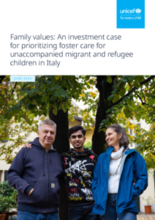Migrant and refugee children arriving in Italy often face significant trauma, having fled war, violence, and exploitation, and survived one of the world’s most dangerous migration routes across the central Mediterranean. Nearly 16,000 unaccompanied minors are currently housed in reception facilities, yet only 4 percent are placed in family-based care such as foster care, despite it being enshrined in law as the preferred alternative. Instead, the overwhelming majority are placed in institutions, where they risk further instability and lack the nurturing environment essential for recovery, growth, and long-term wellbeing.
Foster care provides children with the stability of a loving family, better health and education outcomes, and stronger community ties, while also being more cost-effective than institutional care. UNICEF’s Terreferme project has shown that foster care placements cost municipalities significantly less than residential facilities, with the added benefit of strengthening the social service workforce through training and case management. By contrast, residential care remains costly, under-resourced, and often unable to meet children’s needs. Evidence-based models show that investment in family-based care yields far greater long-term social and economic returns, making foster care a more sustainable and humane solution for migrant and refugee children in Italy.

